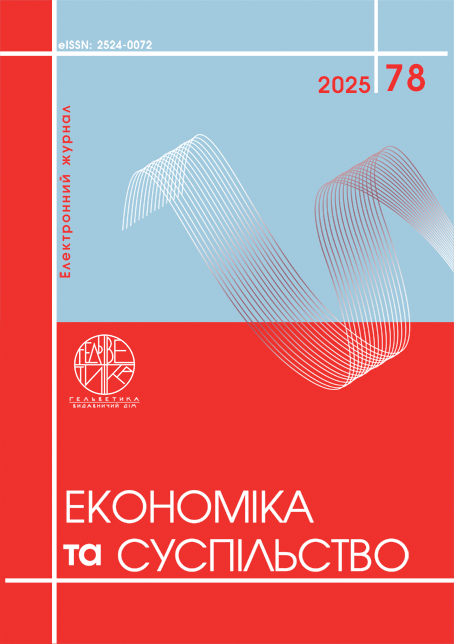THE INFLUENCE OF MANAGEMENT STYLE ON THE EFFICIENCY OF HUMAN CAPITAL USE IN AN ENTERPRISE
Abstract
In the context of globalization, digital transformation, and increasing market volatility, modern organizations face an urgent need to optimize their management systems. This article examines leadership styles as key determinants of increasing the effectiveness of financial and economic decision-making and ensuring the sustainability of the business model. The study argues that adaptive leadership strategies that integrate traditional management approaches with leadership-oriented principles play a key role in stimulating organizational sustainability and innovation. The aim of the article is to study the role of the leader and the impact of leadership style on the effectiveness of the enterprise management system, identify the relationship between leadership styles and organizational performance, and develop practical recommendations for optimizing management approaches in modern conditions. The study offers a comprehensive classification of modern leadership styles - transformational, transactional, situational, service, charismatic, and digital - with a description of their key features, practical applications, advantages, and limitations. Depending on the specific situation, leaders can combine elements of different styles. The emphasis is on the importance of integrating several leadership models depending on the organizational context, the level of employee competence and the dynamic nature of the internal and external environment. The article also emphasizes the growing importance of digital leadership in implementing technological innovations and increasing strategic flexibility. Particular attention is paid to the role of the leader as a mentor and mediator, able to create an environment conducive to innovation, develop human capital and promote strong employee involvement. The effectiveness of enterprise management is largely determined by the chosen leadership style, which determines the nature of communications between the leader and subordinates, the decision-making model, and also shapes the overall corporate culture. The concept of leadership is viewed as a personalized form of corporate governance that combines financial incentives, ethical influence and social responsibility to increase productivity and competitiveness.
References
Михненко А. М., Гончарук Н. Т., Кравченко С. О. Управлінська еліта як чинник суспільного розвитку : монографія / За ред. А. М. Михненка. Київ : НАДУ, 2012. 175 с.
Нестуля О. О., Нестуля С. І., Кононец Н.В. Основи лідерства: електронний посібник. Полтава : ПУЕТ, 2020. 232 с.
A Look at Leadership Styles in Business. URL: https://www.gcu.edu/blog/business-management/look-leadership-styles-business (дата звернення: 20.09.2025).
Becker B. Leadership Styles: The 11 Most Common & How to Find Your Style. URL: https://blog.hubspot.com/marketing/leadership-styles (дата звернення: 21.09.2025).
Lütfi Sürücü1, Dr. Tahir Yeşilada The Impact of Leadership Styles on Organizational Culture. URL: https://www.researchgate.net/publication/319135951_The_Impact_of_Leadership_Styles_on_Organizational_Culture (дата звернення: 23.09.2025).
Томах В. В., Дорошенко Т. М., Тимошенко Ю. В. Стилі лідерства та їх вплив на управління підприємством. Економіка та суспільство. 2024. №60. URL: https://economyandsociety.in.ua/index.php/journal/article/view/3682/3612 (дата звернення: 21.09.2025).
Ліпич Л. Гейміфікація як інструмент стратегічного управління розвитком людського капіталу. Економічний часопис Волинського національного університету імені Лесі Українки. 2023. Том 3. №35. URL: https://doi.org/10.29038/2786-4618-2023-03-136-142 (дата звернення: 02.10.2025).
Буняк Н. Лідерство в системі менеджменту організації. Економіка та суспільство. 2024. № 64. URL: https://economyandsociety.in.ua/index.php/journal/article/view/4327/4253 (дата звернення: 02.10.2025).
Прилепа Н. В. Лідерство в системі управління підприємством. Вісник Хмельницького національного університету. Серія: Економічні науки. 2019. №5. С. 184-187. URL: https://journals.khnu.km.ua/vestnik/wp-content/uploads/2021/01/39-16.pdf (дата звернення: 03.10.2025).
Копчак Ю.С., Матвеєв М.Е., Моторнюк У.І. Особливості впливу різних стилів лідерства на управління підприємством. Вчені записки ТНУ імені В. І. Вернадського. Серія: Економіка і управління. 2024. Том 35 (74). С. 33-39. URL: https://econ.vernadskyjournals.in.ua/journals/2024/35_74_2/9.pdf (дата звернення: 03.10.2025).
Маркіна І. А., Вороніна В. Л., Дмитренко І. А. Лідерство як феномен сучасного менеджменту. Економічний простір. 2020. № 159. С. 88-91. URL: https://prostir.pdaba.dp.ua/index.php/journal/article/view/626/610 (дата звернення: 03.10.2025).
Mykhnenko A. M., Honcharuk N. T., Kravchenko S. O. (2012) Upravlinska elita yak chynnyk suspilnoho rozvytku [The managerial elite as a factor of social development: monograph] monohrafiia [a monograph] / Za red. A. M. Mykhnenka. Kyiv: NADU. 175 p. (in Ukrainian)
Nestulia O. O., Nestulia S. I., Kononets N.V. (2020) Osnovy liderstva: elektronnyi posibnyk [Fundamentals of Leadership: An Electronic Manual]. Poltava: PUET. 232 p. (in Ukrainian)
A Look at Leadership Styles in Business. Available at: https://www.gcu.edu/blog/business-management/look-leadership-styles-business (accessed Sepember 20, 2025)
Becker B. Leadership Styles: The 11 Most Common & How to Find Your Style. Available at: https://blog.hubspot.com/marketing/leadership-styles (accessed Sepember 21, 2025)
Lütfi Sürücü1, Dr. Tahir Yeşilada The Impact of Leadership Styles on Organizational Culture. Available at: https://www.researchgate.net/publication/319135951_The_Impact_of_Leadership_Styles_on_Organizational_Culture (accessed Sepember 23, 2025)
Tomakh V. V., Doroshenko T. M., Tymoshenko Yu. V. (2024) Styli liderstva ta yikh vplyv na upravlinnia pidpryiemstvom [Leadership styles and their impact on enterprise management] Ekonomika ta suspilstvo - Economy and society. Vol. 60. Available at: https://economyandsociety.in.ua/index.php/journal/article/view/3682/3612 (accessed Sepember 21, 2025) (in Ukrainian)
Lipych L. (2023) Heimifikatsiia yak instrument stratehichnoho upravlinnia rozvytkom liudskoho kapitalu [Gamification as a tool for strategic management of human capital development] Ekonomichnyi chasopys Volynskoho natsionalnoho universytetu imeni Lesi Ukrainky – Economic Journal of the Lesya Ukrainka Volyn National University. Vol 3. № 35. DOI: https://doi.org/10.29038/2786-4618-2023-03-136-142 (accessed October 02, 2025). (in Ukrainian)
Buniak N. (2024) Liderstvo v systemi menedzhmentu orhanizatsii [Leadership in the organization's management system] Ekonomika ta suspilstvo – Economy and society. № 64. Available at: https://economyandsociety.in.ua/index.php/journal/article/view/4327/4253 (accessed October 02, 2025). (in Ukrainian)
Prylepa N. V. (2019) Liderstvo v systemi upravlinnia pidpryiemstvom [Leadership in the enterprise management system] Visnyk Khmelnytskoho natsionalnoho universytetu. Seriia: Ekonomichni nauky – Bulletin of Khmelnytsky National University. Series: Economic Sciences. № 5. pp. 184-187. Available at: https://journals.khnu.km.ua/vestnik/wp-content/uploads/2021/01/39-16.pdf (accessed October 03, 2025). (in Ukrainian)
Kopchak Yu.S., Matveiev M.E., Motorniuk U.I. (2024) Osoblyvosti vplyvu riznykh styliv liderstva na upravlinnia pidpryiemstvom [Features of the influence of different leadership styles on enterprise management] Vcheni zapysky TNU imeni V. I. Vernadskoho. Seriia: Ekonomika i upravlinnia – Scientific Notes of V. I. Vernadsky TNU. Series: Economics and Management. Vol. 35(74). pp. 33-39. Available at: https://econ.vernadskyjournals.in.ua/journals/2024/35_74_2/9.pdf (accessed October 03, 2025). (in Ukrainian)
Markina I. A., Voronina V. L., Dmytrenko I. A. (2020) Liderstvo yak fenomen suchasnoho menedzhmentu [Leadership as a phenomenon of modern management] Ekonomichnyi prostir – Economic space. №159. pp. 88-91. Available at: https://prostir.pdaba.dp.ua/index.php/journal/article/view/626/610 (accessed October 03, 2025). (in Ukrainian)

This work is licensed under a Creative Commons Attribution 4.0 International License.


